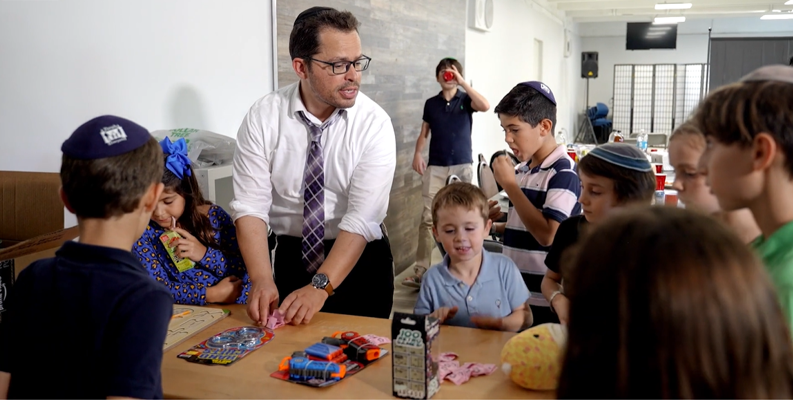
Rabbi Isaac Melnick thinks learning should be fun. As a young teacher in a Hebrew dual-language charter school in South Florida, he ran a lively after-school program that taught Torah to students who wanted to receive Judaic instruction. He called the program Torah 4 Everyone. He also ran Camp Cooluna, a summer camp that offered water slides, crafts and costumes alongside instruction in Jewish scriptures.
When the after-school program was forced to go all virtual during the pandemic, Melnick didn’t miss a beat. He started Jewish American Zoom, which offered Judaic teaching in an atmosphere of entertainment, wacky competitions and prizes that included Amazon gift cards and massive Hershey’s Kisses.
The program, which Melnick called JAZ, was such a hit that some kids lamented it only operated Monday through Thursday.
Now, with more than a decade of experience launching and managing extra-curricular programs, Melnick wants to open a full-fledged Jewish day school. Shorashim Academy is slated to open for the 2023-24 school year in the Hallandale, Florida area.
He’s garnered support from The Drexel Fund, a national philanthropic nonprofit that aids entrepreneurs who want to start private schools that offer greater access to underserved populations and have the potential for replication.
Melnick was recently accepted into the organization’s Founders Program, which is providing him with a year’s salary as well as an opportunity to obtain seed money for startup costs. The fellowship program also offers training on such topics as school governance and budgeting.
As a fellow, Melnick will visit high-performing schools across the country and work with mentors who will help him develop a business plan for the new school.
Melnick and his school were a natural fit for the program according to Eric Oglesbee, director of Drexel’s founder’s program and a Drexel alum who founded River Montessori High School in Indiana.
“At the Drexel Fund, we are attracted to entrepreneurs with a clear and compelling vision for serving underserved populations in their local communities,” Oglesbee said. “Additionally, we are focused on supporting the development of financially sustainable, replicable models that from first principles are likely to produce outstanding academic results and deep character formation.”
What makes Melnick’s vision compelling, Oglesbee said, is his passion paired with his expertise and connections.
“We felt what he needed from us was the opportunity to have an entire year where he could devote 100 percent of his energies toward opening Shorashim Academy and to engage in a customized learning plan with a cohort of other first-time school founders to help him have a strong launch into a sustainable school,” Oglesbee said.
One unique feature of Shorashim Academy is that it will cater to a Jewish population that is more casually observant than those who attend the rapidly growing surrounding day schools in South Florida, which are primarily Orthodox.
“They may celebrate major holidays like Yom Kippur and Passover,” Melnick said. “They may have special meals and traditions and observe some form of Shabbat and occasionally visit the synagogue,” but their lives look more like the surrounding secular culture.
Melnick explained his target families fall into two groups: low-income families for whom a private education is financially unthinkable and middle-income families for whom private school might be possible but would require extreme sacrifices that would force them to forgo vacations and other aspects of a typical middle-class lifestyle.
“These are people who otherwise would not send their children to Jewish day schools,” he said.
Despite the challenges, members of the Orthodox community are required to provide their kids with a Jewish education regardless of the cost.
“I would sell my house,” said Melnick, a husband and father of four who is Orthodox. “Not all families are willing to do that.”
Melnick says Shorashim Academy is needed because Jewish students who don’t attend Jewish schools are at risk of losing their connections to their Jewish identity and Israeli heritage when they become adults. He’s seen that happen to former students from the non-religious Hebrew language charter school who attended his after-school Judaic program.
“Some of these kids are in their 20s, and they are struggling with it,” he said.
That’s why he believes an immersion program is critical. The academy’s name – Shorashim, from the Hebrew word for roots – reflects its purpose.
The school will initially be open to about 30 first and second graders. More grades will be added each year until the school serves students in preschool through 12th grade.
Upper grades are part of the long-range plan, which Melnick expects will take 12 to 15 years to implement.
Each day will begin and end with prayer. Two periods will focus on religious instruction, including fostering of an awareness and appreciation of Israeli culture, with the rest used for academics. Melnick hopes to offer evening Judaic classes for parents.
To make the school accessible to students regardless of income, Melnick plans to accept state K-12 education choice scholarships. He said the Florida Legislature’s recent expansion of state scholarship programs has placed private education within financial reach of more families.
As an example, Melnick explained that a family of six like his can qualify with a household income of up to $148,600. (Step Up For Students, which hosts this blog, manages state K-12 scholarship programs. You can find out more about scholarship programs and the latest eligibility rules here.)
“We’re very grateful for the scholarship program,” he said. “I’m very impressed with how powerful these scholarships are.”


